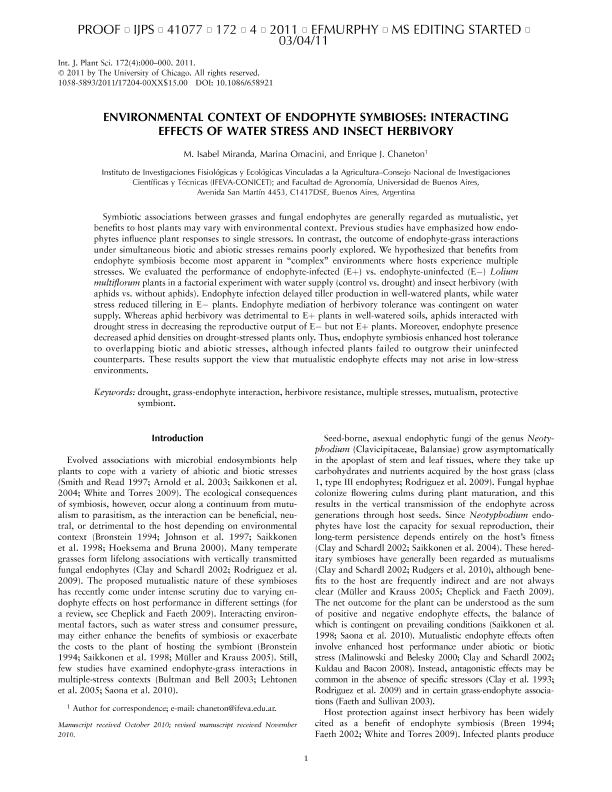Mostrar el registro sencillo del ítem
dc.contributor.author
Miranda, M. Isabel
dc.contributor.author
Omacini, Marina

dc.contributor.author
Chaneton, Enrique Jose

dc.date.available
2020-02-14T20:41:35Z
dc.date.issued
2011-05
dc.identifier.citation
Miranda, M. Isabel ; Omacini, Marina; Chaneton, Enrique Jose; Environmental context of endophyte symbioses: Interacting effects of water stress and insect herbivory; University of Chicago Press; International Journal of Plant Sciences; 172; 4; 5-2011; 499-508
dc.identifier.issn
1058-5893
dc.identifier.uri
http://hdl.handle.net/11336/97677
dc.description.abstract
Symbiotic associations between grasses and fungal endophytes are generally regarded as mutualistic, yet benefits to host plants may vary with environmental context. Previous studies have emphasized how endophytes influence plant responses to single stressors. In contrast, the outcome of endophyte-grass interactions under simultaneous biotic and abiotic stresses remains poorly explored. We hypothesized that benefits from endophyte symbiosis become most apparent in "complex" environments where hosts experience multiple stresses. We evaluated the performance of endophyte-infected (E+) vs. endophyte-uninfected (E-) Lolium multiflorum plants in a factorial experiment with water supply (control vs. drought) and insect herbivory (with aphids vs. without aphids). Endophyte infection delayed tiller production in well-watered plants, while water stress reduced tillering in E- plants. Endophyte mediation of herbivory tolerance was contingent on water supply. Whereas aphid herbivory was detrimental to E+ plants in well-watered soils, aphids interacted with drought stress in decreasing the reproductive output of E- but not E+ plants. Moreover, endophyte presence decreased aphid densities on drought-stressed plants only. Thus, endophyte symbiosis enhanced host tolerance to overlapping biotic and abiotic stresses, although infected plants failed to outgrow their uninfected counterparts. These results support the view that mutualistic endophyte effects may not arise in low-stress environments. © 2011 by The University of Chicago. All rights reserved.
dc.format
application/pdf
dc.language.iso
eng
dc.publisher
University of Chicago Press

dc.rights
info:eu-repo/semantics/openAccess
dc.rights.uri
https://creativecommons.org/licenses/by-nc-sa/2.5/ar/
dc.subject
DROUGHT
dc.subject
GRASS-ENDOPHYTE INTERACTION
dc.subject
HERBIVORE RESISTANCE
dc.subject
MULTIPLE STRESSES
dc.subject
MUTUALISM
dc.subject
PROTECTIVE SYMBIONT
dc.subject.classification
Ecología

dc.subject.classification
Ciencias Biológicas

dc.subject.classification
CIENCIAS NATURALES Y EXACTAS

dc.title
Environmental context of endophyte symbioses: Interacting effects of water stress and insect herbivory
dc.type
info:eu-repo/semantics/article
dc.type
info:ar-repo/semantics/artículo
dc.type
info:eu-repo/semantics/publishedVersion
dc.date.updated
2020-02-07T13:49:21Z
dc.journal.volume
172
dc.journal.number
4
dc.journal.pagination
499-508
dc.journal.pais
Estados Unidos

dc.journal.ciudad
Chicago
dc.description.fil
Fil: Miranda, M. Isabel. Consejo Nacional de Investigaciones Científicas y Técnicas. Oficina de Coordinación Administrativa Parque Centenario. Instituto de Investigaciones Fisiológicas y Ecológicas Vinculadas a la Agricultura. Universidad de Buenos Aires. Facultad de Agronomía. Instituto de Investigaciones Fisiológicas y Ecológicas Vinculadas a la Agricultura; Argentina
dc.description.fil
Fil: Omacini, Marina. Consejo Nacional de Investigaciones Científicas y Técnicas. Oficina de Coordinación Administrativa Parque Centenario. Instituto de Investigaciones Fisiológicas y Ecológicas Vinculadas a la Agricultura. Universidad de Buenos Aires. Facultad de Agronomía. Instituto de Investigaciones Fisiológicas y Ecológicas Vinculadas a la Agricultura; Argentina
dc.description.fil
Fil: Chaneton, Enrique Jose. Consejo Nacional de Investigaciones Científicas y Técnicas. Oficina de Coordinación Administrativa Parque Centenario. Instituto de Investigaciones Fisiológicas y Ecológicas Vinculadas a la Agricultura. Universidad de Buenos Aires. Facultad de Agronomía. Instituto de Investigaciones Fisiológicas y Ecológicas Vinculadas a la Agricultura; Argentina
dc.journal.title
International Journal of Plant Sciences

dc.relation.alternativeid
info:eu-repo/semantics/altIdentifier/doi/http://dx.doi.org/10.1086/658921
dc.relation.alternativeid
info:eu-repo/semantics/altIdentifier/url/https://www.journals.uchicago.edu/doi/10.1086/658921
Archivos asociados
